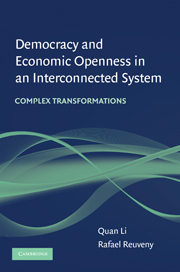Book contents
- Frontmatter
- Contents
- List of Figures and Tables
- Acknowledgments
- 1 Introduction
- PART I THE DEMOCRACY–ECONOMY NEXUS
- PART II BRINGING IN CONFLICT
- PART III BRINGING IN THE ENVIRONMENT
- 7 Democracy and the Environment
- 8 Economic Openness and the Environment
- 9 Conflict and the Environment
- 10 Conclusion
- References
- Author Index
- Subject Index
8 - Economic Openness and the Environment
Published online by Cambridge University Press: 05 June 2012
- Frontmatter
- Contents
- List of Figures and Tables
- Acknowledgments
- 1 Introduction
- PART I THE DEMOCRACY–ECONOMY NEXUS
- PART II BRINGING IN CONFLICT
- PART III BRINGING IN THE ENVIRONMENT
- 7 Democracy and the Environment
- 8 Economic Openness and the Environment
- 9 Conflict and the Environment
- 10 Conclusion
- References
- Author Index
- Subject Index
Summary
INTRODUCTION
In Chapter 7, we studied the effect of democracy in a country on various types of environmental degradation, controlling for international trade merely as a secondary force. This chapter studies how international trade and its interaction with democratic governance influence the terrestrial environment. Specifically we examine land degradation and deforestation, two indicators that reflect the health of the terrestrial environment of a country. These two dimensions of the terrestrial environment have an important impact on food production and climate change – two issues that have posed serious challenges to the contemporary world.
Land degradation significantly constrains a country's ability to provide food for its people and animals, including animals to be consumed. A rise in land degradation often reduces the land's productivity and, therefore, food yields. Because of growing populations and land degradation, many less developed countries (LDCs) find that their people have to confront declining food security. The problem is intensifying as rising oil prices have induced food crises in many poor countries.
Deforestation has important environmental implications, including global warming: it speeds up land erosion, causes fresh water supplies to decline, reduces the level of biodiversity, raises the levels of sedimentation in rivers and lakes, intensifies sand and dust storms, increases the occurrence of mudslides, and deteriorates air quality. In fact, the Intergovernmental Panel on Climate Change has listed deforestation as a key driver of climate change.
- Type
- Chapter
- Information
- Democracy and Economic Openness in an Interconnected SystemComplex transformations, pp. 239 - 265Publisher: Cambridge University PressPrint publication year: 2009



